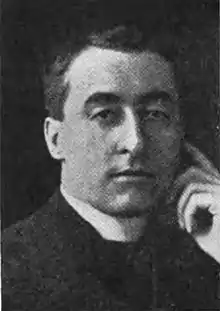Antonio Demo
Antonio Demo CS (April 23, 1870 – January 2, 1936) was an Italian American Catholic priest and civic activist.
Antonio Demo | |
|---|---|
 | |
| Orders | |
| Ordination | July 20, 1896 |
| Personal details | |
| Born | April 23, 1870 Lazzaretto di Bassano, Veneto, Italy |
| Died | January 2, 1936 (aged 65) New York City, United States |
| Denomination | Roman Catholic |
He studied at seminaries in Italy and entered the Scalabrini Order in 1894. Prior to his ordination, Demo served in the Italian military.[1] He was ordained a priest on July 20, 1896, the same year he emigrated to the United States. He initially did missionary work for two years in the parish of the Sacred Heart in Boston, which served a congregation of Italian immigrants mostly from Genoa. On July 19, 1899, he was assigned as assistant pastor of Our Lady of Pompeii Church, established in 1892 by Father Pietro Bandini in New York City's Greenwich Village on Bleecker and Carmine Streets. In 1900, he was appointed pastor of the church, which served what was then one of largest Italian-American communities in America.[2][3]
Father Demo exercised his apostolate among the Italian immigrants, serving until 1923 also as the director of the St. Raphael Society for the Protection of Italian Immigrants, an organization that had been specifically formed in 1891 by Bandini to assist newly arrived immigrants and that he helped to strengthen.[2] His spiritual care and leadership were put to test on March 25, 1911, when he had to respond to the tragic Triangle Shirtwaist Company fire, which claimed the lives of 146 female employees.[4] Because of his many merits in the care of the Italian community, he was decorated with the "Cross of Knight of the Crown of Italy".[3]
In 1923 Father Demo learned that the church would have to be demolished to allow extension of the Sixth Avenue. Father Demo organized a campaign to buy a nearby property and with the help of a leading Italian American architect, Matthew Del Gaudio, build a new church and rectory. The new church was available for the congregation in May 1927. In late summer of 1931, the parochial school also was opened.[2]
In 1935, Father Demo became Pompeii's pastor emeritus and superintendent of its parochial school. He died in 1936 in Greenwich Village in New York City, and thousands of parishioners and friends, including Mayor Fiorello La Guardia, paid their respects.[5]
In 1941, the intersection of Bleecker Street and Sixth Avenue was named Father Demo Square.[6] In 2009, after a renovation, Father Demo Square was honored with a Village Award[7] by the Greenwich Village Society for Historic Preservation.

References
Notes
- "Our Lady of Pompei and Father Demo's Photographs". Researching Greenwich Village History. October 1, 2013. Archived from the original on October 11, 2016. Retrieved September 4, 2018.
- Nicholas Joseph Falco, "Antonio Demo."
- "P. ANTONIO DEMO". www.scalabrini.org. Retrieved 2020-09-26.
- "Father Demo Square Highlights : NYC Parks". www.nycgovparks.org. Retrieved Jun 3, 2019.
- Brown, Mary Elizabeth (October 2007). Fierro, Rafaele (ed.). The Italians of the South Village (PDF). New York, New York: Greenwich Village Society for Historic Preservation. p. 47. Archived (PDF) from the original on March 15, 2018. Retrieved September 4, 2018.
- Father Demo Square – Historical Sign at www.nycgovparks.org
- "Past Village Award Winners". GVSHP.org. Archived from the original on 28 May 2015. Retrieved 2 June 2015.
Bibliography
- Brown, Mary Elizabeth. "Italian Immigrant Catholic Clergy and an Exception to the Rule: The Revered Antonio Demo, Our Lady of Pompeii, Greenwich Village, 1899-1933." In Church History 62.1 (March 1993): 41–59.
- Falco, Nicholas Joseph. "Antonio Demo." In The Italian American Experience: An Encyclopedia, ed. Salvatore J. LaGumina (New York: Garland, 2000), 177–78.
_-_2.JPG.webp)